- Home
- Georgette Heyer
Acting on Impulse Page 8
Acting on Impulse Read online
Page 8
THE END
READING “LINCKES’ GREAT CASE”
It’s not that it’s boring, exactly. It’s… fine. But as a devotee of Heyer’s crime fiction, especially her Inspector Hannasyde novels, it is somewhat disappointing to read this rather pedestrian tale of stolen documents and the pursuit of the very obvious thief that takes so, so, way too long to unfold.
When it comes to Georgette Heyer, no matter what the genre, we expect more than “fine.”
Of course, everyone has to start somewhere, even authors who saw such overnight success as Heyer, and because her first novel was such a tour de force, and is still in print nigh on a century later, it is easy to forget that she was so very young when she wrote it, and that even when this later story was published, in March of 1923, she was not yet even twenty-one years of age.
The theory propounded in the introduction to this piece, that perhaps George Heyer had a significant hand in this somewhat plodding outing, is certainly one explanation for its somewhat lacklustre nature (with apologies to George Heyer, who was an author and poet and general polymath, and whom Georgette adored), but I would offer up an alternate theory: it’s all the younger Heyer’s own work, but is just not very good, because not all early work is. And perhaps it is very different to her “style” simply because she had not yet figured out what that was.
Take, for example, her historical fiction novel The Great Roxhythe, published in 1922, and her 1923 contemporary novel Instead of the Thorn, both wildly different – and, it must be said, less successful – than The Black Moth. That The Transformation of Philip Jettan, now known, in slightly modified form, as Powder and Patch, was also published in 1923 showcases Heyer’s range of experimentation during this period of her writing career, and Linckes’ Great Case could very simply be yet another one of her attempts to find her voice, and her passion, and extend herself beyond the Georgian romps that evidently came so naturally to her.
Certainly, the developing romance of Linckes and Tony, the privileged daughter of a government minister, is pure Georgette, although it is interesting that their class difference does not seem to make much of a difference here – it might be a subtle distinction, but the sprightly Autonia (erk, what a name!) appears to be a scion of the County set while Linckes is, though well-spoken, clearly a working man hailing from the stolid middle class—even if their fathers did go to school together. Although, honestly, quite what Tony finds to so admire about Linckes is perhaps a bigger mystery than who stole those dratted documents could ever be.
The culprits are in many ways the most compelling characters of this narrative, for all that they are terribly incompetent and only get away with it for so long because Linckes is even more so. Sir Charles Winthrop is a smooth devil, and there are shades of the supercilious Duke of Andover/Avon model about him – it is understandable that Linckes falls into something of an infatuation with him, and we know that Heyer was very into male friendship narratives at this time, given The Great Roxhythe’s central pairing of the Marquis and his devoted secretary, Christopher. Far better developed than Linckes/Tony is Linckes/Sir Charles, especially since the morose Alec constantly keeps Linckes guessing, making it seem that Winthrop is blowing hot and cold, and making him all the more fascinating to a young and easily-impressed ingenu like poor Roger Linckes as a result.
I’ve read more than my share of pulp detective fiction of this era, and Linckes’ Great Case is not wholly unlike much of what was being published at the time – in fact, it’s something of a cut above even the other stories published even in the very same issue of Detective Magazine in which it appeared. (“The Karlovna Jewel Mystery” by T. B. Donovan is especially dire.) The characters are two-dimensional, certainly. But they do have their charms, and occasional witticisms, and they’re not entirely inconsistent with Heyer’s later works. If only the mystery at the centre of this tale had been solved over the course of days and weeks rather than weeks and months, it might stand as an impressive first attempt at the field.
But it’s not Heyer¸ not yet anyway, and that is what leads to the speculation that she didn’t write it entirely by herself – we don’t want to believe that someone so remarkable could have turned in something so relatively ordinary.
But I think she probably did.
And think that’s… fine.
“THE BULLDOG AND THE BEAST”
INTRODUCTION
Heyer returned to The Happy Mag for her fourth excursion into short fiction. “The Bulldog and the Beast” was published there in March 1923, the same month that “Linckes’ Great Case” was published in The Detective Magazine, although the two stories are completely different from each other. Unlike “Linckes”, “The Bulldog and the Beast” is a romantic tale, and there is a noticeable difference between the two stories in style, tone, and execution. “The Bulldog and the Beast” is more tightly plotted than “Linckes” and the story is far more engaging. It is also a decided step up from either “A Proposal to Cicely” or “The Little Lady” for here it seems, Georgette Heyer had found her short story “voice.”
From the first sentence we are amused and a little intrigued. Beginning with: “Upon the stairs which led to his flat, Hugh Ruthven met the bull-dog,” the story quickly evolves into a clever three-hander with Hugh, Mr. Sykes (the engaging and intelligent canine), and Katharine Testram, the bulldog’s adoring owner, all becoming inextricably linked. Mr. Sykes is instantly lovable and the way he directs the action is comical and clever. Sykes is the lynch-pin of the story and Heyer’s pithy romance is lifted above the average by his presence. Though there is instant animosity between the man-hating Miss Testram and the cynical Mr. Ruthven, both protagonists love Mr. Sykes and in Heyer’s world this is a sign of both good character and intelligence.
Heyer had dogs through much of her life. From her mother’s beloved Dachshund to her own Pekingese (the very same who was perhaps the model for Chu-Chu San in “A Proposal to Cicely”) and her grandmother’s terriers, she knew and loved dogs from early childhood. As an adult, Heyer had a Sealyham terrier named Roddy; after Roddy came her adored bull terrier Jonathan Velhurst Viking (known as Jonny), and her magnificent wolfhound, Misty Dawn. Jonny would be her last four-legged friend, but Heyer would always have fictional dogs – delightful imaginary dogs who would come to life in her books. Mr. Sykes epitomises Heyer’s emotional connection to dogs and he would prove to be the fictional forerunner of the memorable canines that would eventually populate her Regency novels: Ulysses in Arabella, Tina in The Grand Sophy and Lufra in Frederica.
Like those felicitous creations, Mr. Sykes is delightful and Heyer brings him endearingly to life. Sykes snorts and waddles and snuffles and squirms his way through the story as he tries his best to bring his belligerent owner and the man she detests together. Heyer is finally hitting her short story straps here and allowing her natural wit and humour a much freer rein. Her voice is crisp, her characters more fully realised, and the story flows from the first sentence.
As always, class attitudes are inherent in Heyer’s depiction of upper middle-class people in 1920s England. Katharine is only poor because her once-wealthy father has invested his money badly. Her father has died and she must earn her living as a paid companion to a difficult great-aunt. Hugh Ruthven is one of Heyer’s independent men of means and, though he lives in a flat, he has a man-servant, a cook, and a parlour maid. Hugh also has a racing-car, is often at home during the day, and has no apparent need to work. This is the aspirational world so popular with readers after the Great War. Heyer needed only to sketch these details in lightly but she did so with a deftness that fleshes out her characters and evokes her readers’ empathy.
“The Bulldog and the Beast” is the first of three short stories which would signal the tone of the clever comedic novels yet to come.
THE BULLDOG AND THE BEAST
UPON the stairs which led to his flat, Hugh Ruthven met the bulldog. They eyed one another silently for a moment, until the bulldog signified his
approval of this new acquaintance by a loud snort.
“I entirely agree with you,” said Ruthven.
The bulldog seemed pleased with this remark: he snuffled engagingly by and waddled upstairs in Ruthven’s wake. With his latch-key held ready, Ruthven again addressed the bulldog.
“Like to come in?” he inquired.
The bulldog said that he would. He said it quite plainly, with his ears and tail.
In the cosy hall, over a sweet biscuit, they made friends. The bulldog then wandered about the hall on a tour of inspection. He was interrupted by a girl’s voice, calling from without.
“Sykes! Sykes! Where are you, Mr. Sykes? Here, boy!”
The bulldog waddled to the door, and looked over his shoulder at his host.
“My dear Mr. Sykes,” Ruthven addressed him, “if you belong to a member of what we blindly and mistakenly call ‘the gentle sex’, you have my sympathy.”
The bulldog seemed to deprecate this remark. The voice called again and he snorted loudly.
Ruthven rose languidly.
“You are mistaken,” he said. “When you have had more experience of women you will know that there is nothing harder, more cruel, and more treacherous. Do you still wish to rejoin your mistress?”
Mr. Sykes wagged the whole of his hindquarters.
“You do. Far be it from me, then, to seek to detain you. Farewell.” Ruthven opened the door and watched Mr. Sykes waddle out. A dark girl stood at the head of the stairs. She greeted her strayed property joyfully, but in the middle of her welcome, she perceived Ruthven, and a hard light came into her eyes.
“I must apologise for harbouring your dog,” Ruthven said smoothly, yet with that bitter note in his voice.
“Not at all,” said the girl stiffly. She called to Mr. Sykes, and went into the opposite flat. The door shut with a decided click.
Katharine Testram eyed Mr. Sykes sadly.
“Sykes, how could you?” she demanded.
Mr. Sykes squirmed apologetically.
“A man!” said Katharine. “Don’t you know that men are hateful, cruel, fickle creatures?”
Mr. Sykes cocked his ears a little.
“They are!” averred Katharine stoutly. “Don’t you forget how a man treated me—and how a man treated poor Lucille.”
Mr. Sykes licked her hand.
“You can’t judge all men by two rotters,” said his ears.
“They’re all the same,” said Katharine, positively. “’Cept you.”
From which cryptic remark it will be gathered that a man had treated Katharine very badly. As was indeed the case.
A year ago her father had died, leaving her his blessing. And that was all he had to leave, save some debts. It had been a severe shock to Katharine, for she had always expected to be well-off, and had never troubled her head about money-matters. But Mr. Testram had been led astray in his investments, with the result that Katharine was left with just fifty pounds a year, and a bulldog. She was engaged to be married—and her fiancé broke it off.
Now she was acting as companion to her great-aunt, a crotchety, exacting old lady who never failed to impress two facts upon her niece: one, that she had allowed her to keep Mr. Sykes as a great concession; two, that Katharine should not expect to be mentioned in her will.
Only the dread thought of having to part with Mr. Sykes induced Katharine to remain with Mrs. Hilton. She would have preferred to seek a living in almost any other way, but she realised that were she to strike out on her own, Mr. Sykes would have to be sacrificed. And Mr. Sykes was all that remained to her.
MR. SYKES, having once tested the hospitality of Hugh Ruthven, that sore and jilted woman-hater, and found it good, made a point of visiting him regularly. Hardly a day passed but Ruthven would hear an inquisitive snort outside his door and when he went to open it, in would come Sykes with his rolling gait, and his expectantly cocked ears.
They became fast friends, to the annoyance of Sykes’ mistress. Once she marched across the strip of passage separating the two flats, and coldly demanded her property from Ruthven’s man-servant. She was asked to come inside, and very reluctantly she did so.
Ruthven came to her, Sykes at his heels, and the sight of her dog placidly following him, infuriated Katharine. Her dark eyes flashed, and her lips grew hard.
“I must really ask you not to entice my dog to visit you!” she said sharply.
Ruthven raised his eyebrows slightly. He bent to pat Mr. Sykes.
“You are labouring under a delusion, Miss—?”
“My name doesn’t matter. Come, Sykes!”
“Not in the slightest,” drawled Ruthven. “As I was saying, you are mistaken. I have never—er—enticed your dog. He seems to like my company.”
“Then may I ask that you will not admit him again?”
Ruthven smiled a little mockingly.
“Certainly you may.”
Katharine’s colour rose. “I don’t know how you managed to bribe him,” she said bitingly, “but I beg you will discontinue your efforts. I do not allow him to stray away to other people’s flats. I very much object to it.”
Ruthven looked her over, still faintly smiling.
“One would almost imagine that you had some grudge against me,” he remarked languidly.
Katharine drew herself up.
“I know nothing about you except that you persist in encouraging my dog to come into your flat, but I dislike the whole of your sex.” She could have bitten her tongue out as soon as the foolish words had left her mouth.
Ruthven’s eyes widened.
“How very interesting,” he replied. “I, myself, abominate the female of the species. Now we understand one another. I am glad you called today, as I have been wishing to see you. I should like to buy your dog.”
Katharine swept to the door.
“He is not for sale,” she said stiffly. “Sykes!”
Ruthven bowed her out. He shut the door and addressed himself sardonically.
“There you have the worst type of woman,” he informed himself. “A spitfire. I wonder who the man was?”
“Don’t you go over there again!” Katharine adjured Mr. Sykes. “He’s a perfectly hateful creature. How dared he smile at me like that?”
Mr. Sykes snuffled aggrievedly.
“He may be handsome,” said Katharine severely, “but he’s a Beast!”
Mr. Sykes waddled away. There were times when he found his mistress a trifle wearisome.
MISS TESTRAM and Mr. Ruthven lost no time in finding out each other’s names. Whenever they chanced to meet, either in the lift or upon the stairs, they cut one another dead. Only Mr. Sykes continued to gravitate between them. There was that in Mr. Ruthven that appealed to him. And Ruthven continued to admit Mr. Sykes into his flat.
Also he maintained a deaf ear to Miss Testram’s voice without, calling her property, so that she was compelled, mostly, to cross his threshold. Why he did this he had no idea. It was of course ridiculous that he should want to see the lady, for on these occasions they were exceedingly hostile towards each other, not to say rude.
One day when Katharine called at Ruthven’s flat for the straying Mr. Sykes, Ruthven greeted her with a malicious smile.
“I regret to say that Sykes is not with me,” he said.
“Not with you? Then where—I don’t believe you!”
Ruthven bowed.
“Give him to me at once, please!”
“He isn’t here.”
“Then where is he?” she demanded suspiciously. “Have you stolen him?”
“You can hardly expect to answer that question,” he replied. “Have you lost him?”
“You know very well that I have!” she snapped, and hurried out.
Two hours later, Ruthven strolled out of his flat and inquired casually of the hall-porter whether Miss Testram’s dog had been found. On being told that Miss Testram’s dog had not been found, he went out and slid into his racing car.
He spied Mr. S
ykes at length, plodding homewards, quite near the block, with an end of rope trailing behind him.
Ruthven slowed down and invited the somewhat grimy Sykes to enter the car. Relievedly the bulldog clambered in and licked Ruthven’s hand by way of thanks.
Arrived once more at the block of flats, Ruthven surveyed his protégé gravely.
“Mr. Sykes. honesty compels me to remark that you are not over-clean.”
Mr. Sykes heaved a large sigh.
“Also—to put it plainly—that you smell.”
Mr. Sykes wagged his tail guiltily.
“I suggest that we repair to my flat. I can hardly return you to the Spitfire in that condition. A bath is what you need.”
Mr. Sykes, hearing the hated word, followed him dejectedly into the lift.
“MR. RUTHVEN’S compliments, miss, and he has found Mr. Sykes, and will return him as soon as he is dry.”
“Found him? Oh, thank heaven! Where is he? Send him to me at once, please!”
“You see, miss, the dog was a bit dirty, and Mr. Ruthven has been washing him,” explained the man.
Katharine hesitated. Then she came out of the flat and shut the door. “I’ll come and fetch him,” she said.
She found Mr. Sykes wrangling amicably with his host and an old towel.
“Thank you for taking so much trouble over Sykes,” she said frigidly. “I am sorry I accused you of stealing him.”
“Not at all,” answered Ruthven, just as coldly. “Won’t you sit down?”
“I should prefer to take him home at once, thank you.”
“Certainly,” shrugged Ruthven.
A month later, Ruthven slit open a letter addressed to him in an unknown but palpably feminine hand-writing, and read as follows:—
“Dear Mr. Ruthven,
“Circumstances over which I have no control compel me to part with Mr. Sykes. If you still wish to purchase him, perhaps you will communicate with me. I enclose his pedigree. I am asking twenty guineas for him.

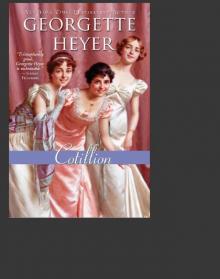 Cotillion
Cotillion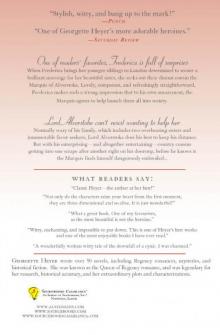 Frederica
Frederica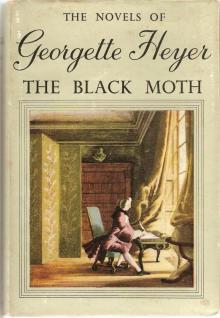 The Black Moth: A Romance of the XVIIIth Century
The Black Moth: A Romance of the XVIIIth Century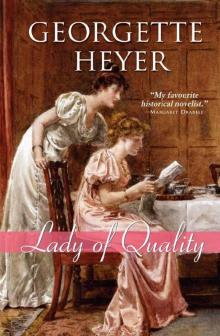 Lady of Quality
Lady of Quality Snowdrift and Other Stories
Snowdrift and Other Stories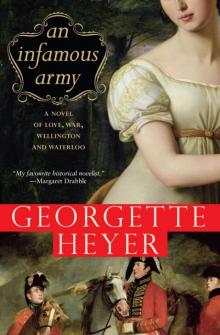 An Infamous Army
An Infamous Army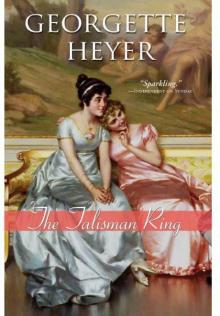 The Talisman Ring
The Talisman Ring Venetia
Venetia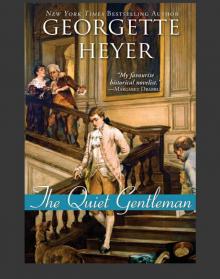 The Quiet Gentleman
The Quiet Gentleman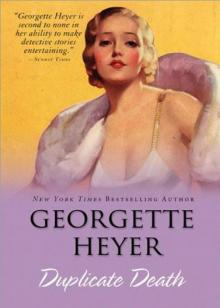 Duplicate Death
Duplicate Death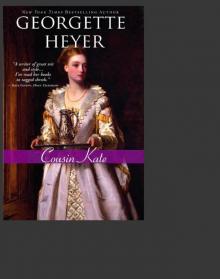 Cousin Kate
Cousin Kate Black Sheep
Black Sheep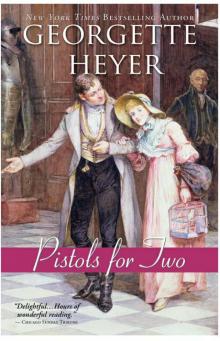 Pistols for Two
Pistols for Two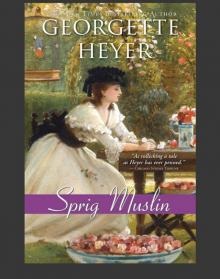 Sprig Muslin
Sprig Muslin No Wind of Blame
No Wind of Blame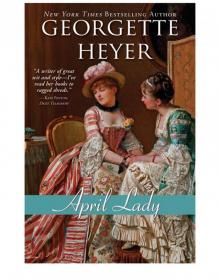 April Lady
April Lady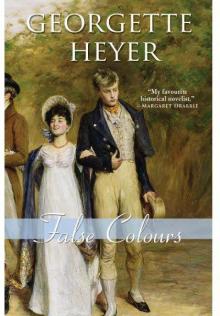 False Colours
False Colours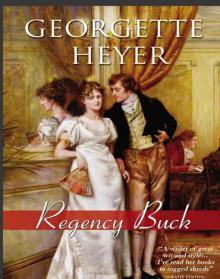 Regency Buck
Regency Buck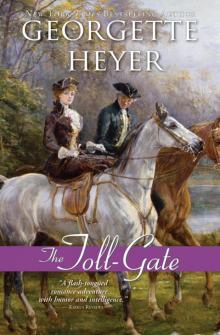 The Toll-Gate
The Toll-Gate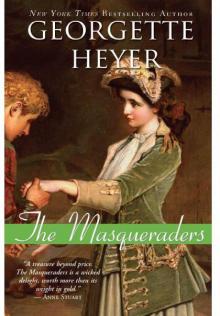 The Masqueraders
The Masqueraders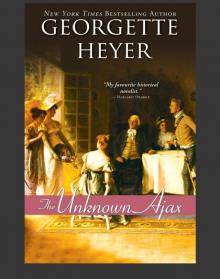 The Unknown Ajax
The Unknown Ajax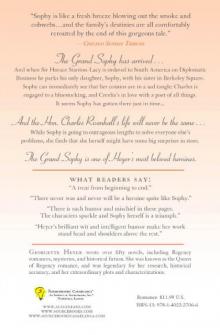 The Grand Sophy
The Grand Sophy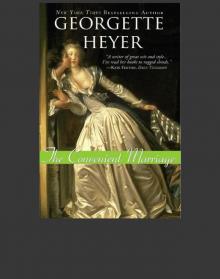 The Convenient Marriage
The Convenient Marriage Faro's Daughter
Faro's Daughter The Conqueror
The Conqueror The Foundling
The Foundling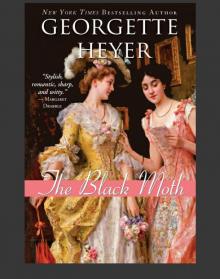 The Black Moth
The Black Moth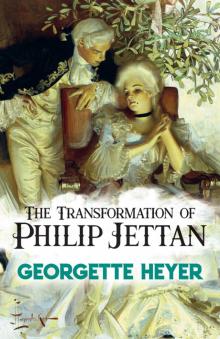 The Transformation of Philip Jettan
The Transformation of Philip Jettan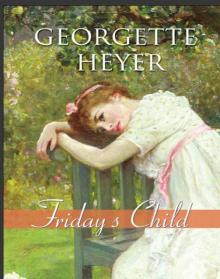 Friday's Child
Friday's Child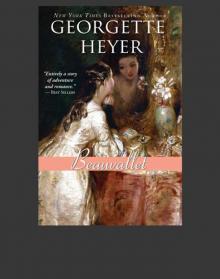 Beauvallet
Beauvallet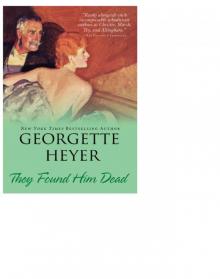 They Found Him Dead
They Found Him Dead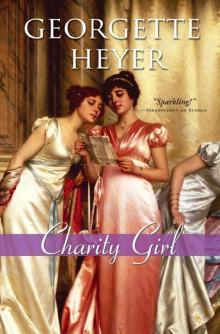 Charity Girl
Charity Girl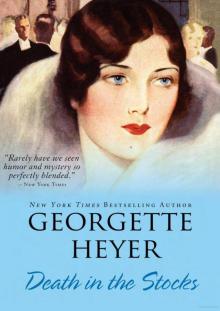 Death in the Stocks: Merely Murder
Death in the Stocks: Merely Murder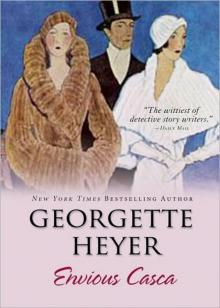 Envious Casca
Envious Casca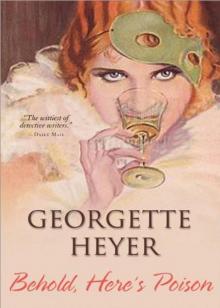 Behold, Here's Poison
Behold, Here's Poison Arabella
Arabella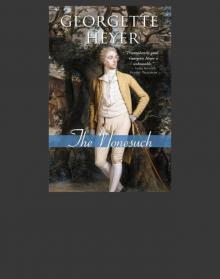 The Nonesuch
The Nonesuch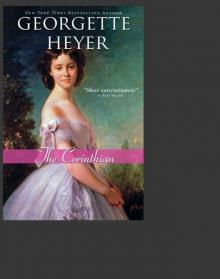 The Corinthian
The Corinthian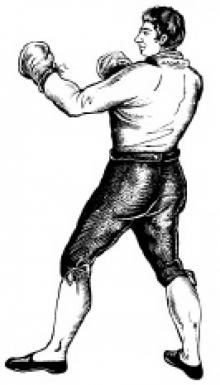 Jennifer Kloester
Jennifer Kloester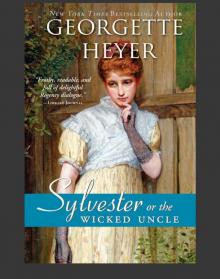 Sylvester
Sylvester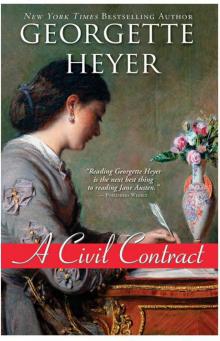 A Civil Contract
A Civil Contract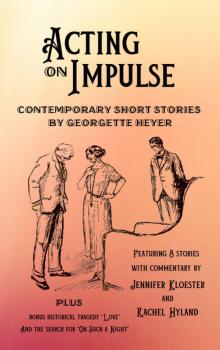 Acting on Impulse
Acting on Impulse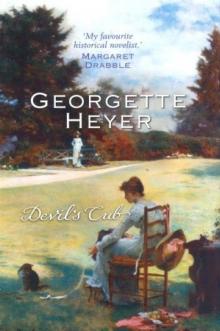 Devil’s Cub at-2
Devil’s Cub at-2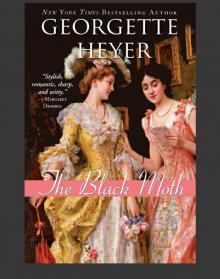 Black Moth
Black Moth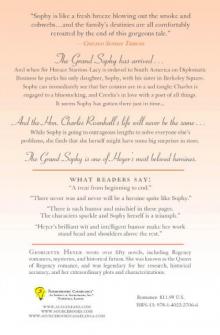 Grand Sophy
Grand Sophy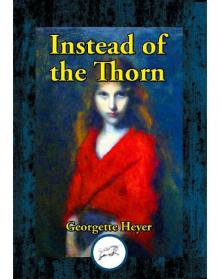 Instead of the Thorn
Instead of the Thorn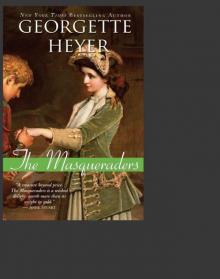 Masqueraders
Masqueraders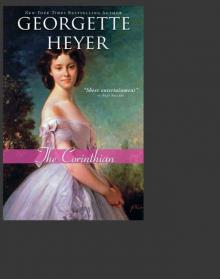 Corinthian
Corinthian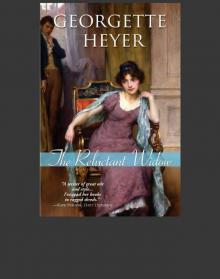 Reluctant Widow
Reluctant Widow